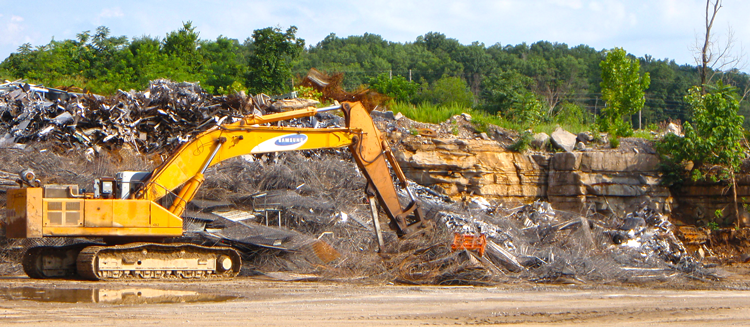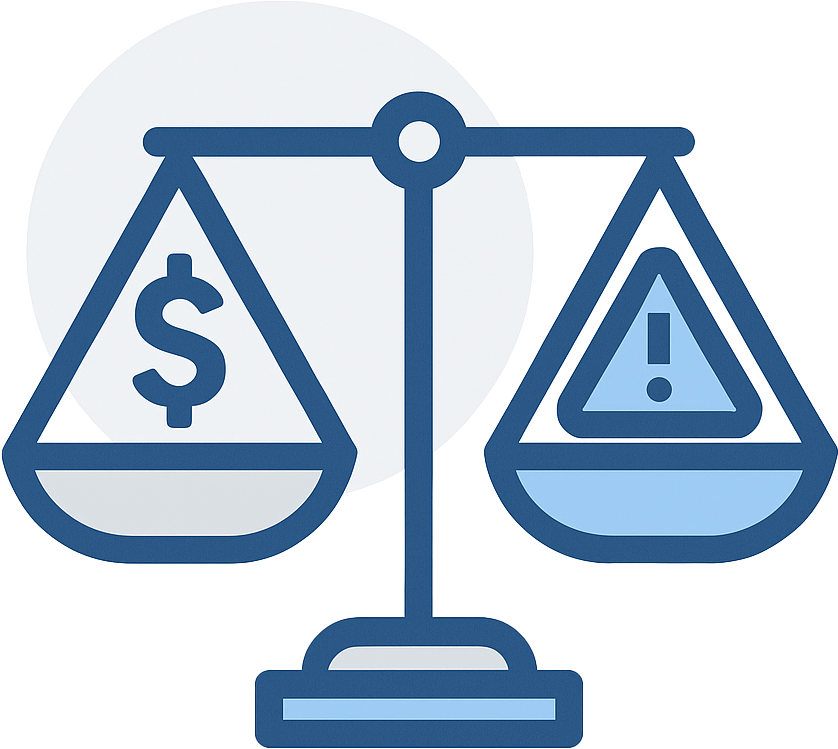The rules regarding Class A Recycling Permits & Approvals in New Jersey, metal recycling, scrapyards, junkyards, and auto salvage yards.
There's a lot going on with metal recycling and auto salvage yards these days in New Jersey. The NJDEP is cracking down on recycling operations, the need for recycling permits or approvals, and finding facilities not complying with the regulations they should be, often issuing fines and penalties.
Last year was the year of enforcement, or so it seemed. We talked to a lot of recyclers from all over the state who were getting in trouble for not having the right permits. And so far, this year is no different. We're getting calls with questions like what's a class A recycling permit? Do scrap metal recyclers need a recycling permit in New Jersey? Does my junkyard need a recycling permit?
And they're great questions because knowing the answer can mean the difference between fines costing you time and money, or being in compliance and not worrying about a thing. In order to clear a few things up first, let's talk about New Jersey recycling approvals and recycling facilities.
Do I need an NJ recycling permit for my metal recycling operation or auto salvage yard?
That depends entirely on if you're considered a "recycling center", which the NJDEP describes as:
A facility designed and operated solely for receiving, storing, processing or transferring source separated recyclable materials (Class A, Class B, Class C and/or Class D recyclable material). Recycling centers shall not include recycling depots, manufacturers, or scrap processing facilities.
That's about as clear as mud, thanks NJDEP. I'll try to clear this up. Note that it says receives, stores, transfers, or processes recycling materials.
Many metal recyclers or scrapyards out there don't process anything, so that clears that term. But! If you receive recyclable material, then you're technically a recycling center. If you put that material into containers, stockpile it or hold it on your site somewhere, you're storing recyclable materials. And, if you send it back out the front gate, whether it's in your truck or not, and regardless of where it's going, then you're transferring recyclable material.
Of course, if you are processing material, then that makes you a recycling center too. And by the NJDEP, processing means "the treatment or transformation of source separated recyclable materials so as to conform to end-market specifications, including, but not limited to, separating material by type, grade or color, crushing, grinding, shredding or baling or removing contaminants."
Read that again. Separating materials by type is processing. A lot of facilities separate materials by their type, meaning they process recyclable materials. The point is, the NJDEP casts a wide net that many junkyards, scrapyard, and metal recyclers in New Jersey fall under, meaning that a Class A recycling approval may be necessary.

Do I need a Class A New Jersey recycling approval if I'm a metal recycler?
Here's the definition of Class A recyclable materials:
Source separated non-putrescible recyclable material specifically excluded from Department approval prior to receipt, storage, processing or transfer at a recycling center in accordance with N.J.S.A. 13:1E-99.34b, which material currently includes source separated non-putrescible metal, glass, paper, plastic containers, and corrugated and other cardboard.
Got that? Metal! If you're wondering, non-putrescible means it won't rot. Metal doesn't rot, and according to this definition, metal is 100% a Class A recyclable material. So, if you meet the definition above of a recycling center, and your material is a metal, then in the eyes of the NJDEP, you need a Class A Recycling Approval.
I'll mention that certain types of facilities can get covered under a New Jersey recycling exemption, but there are serious limitations on what kind of facility you are and what you can do, and they're strictly enforced. How does your operation fit this profile? Hopefully, you're in compliance and up to snuff. If not, contact us online or give us a call and we can discuss your situation.

What about scrap processing facilities in New Jersey?
Remember above, the NJDEP definition of a recycling center specifically excludes scrap processing facilities. Now just because you call your lot a junkyard or scrapyard doesn't automatically mean it applies to you. Here's what the NJDEP considers a scrap processing facility:
A commercial industrial facility designed, and operated for receiving, storing and transferring source separated, non-putrescible ferrous and nonferrous metal, which materials are purchased by the owner or operator thereof, and which are altered or reduced in volume or physical characteristics onsite by mechanical methods, including, but not limited to, baling, cutting, torching, crushing, or shredding, for the purposes of resale for re-melting, refining, smelting or remanufacturing into raw materials or products.
That sure sounds like most metal recyclers I've dealt with! They are commercial facilities that operate to receive, store, transfer and do some processing of the metal that comes in for the purposes of reselling it to downstream sources. Right?
By the way, if you're not sure what downstream sources are, they're the people you sell your end product to, or send your materials to. They aren't literally located down the river.
Anyway, so recycling centers do not include scrapyards or junk yards. Sounds like you just got off the hook, right from a Class A recycling approval, right? Not really, so let's review real quick:
- Metal is a Class A recyclable material.
- Recycling centers need an approval from the NJDEP, except for recycling depots, manufacturers, or scrap processing facilities.
- Metal recyclers need a Class A recycling permit.
- But scrap processing facilities do not.
Are you confused? I am too.

Metal Recycling vs Scrap Processing
If you recycle metal, you might either fit the definition of a recycling center (which needs a Class A approval), or a scrap processing facility (which does not). But why one versus the other, and what's the difference?
Just a piece of info, most facilities that choose the Class A recycling permit route also recycle other Class A recyclable materials, such as cardboard, paper, glass, etc. That means they are mixed recycling facilities. From what I've seen, and what I've heard from the NJDEP, is that most facilities that just recycle metal are considered scrap processing facilities.
Metal Recycling Facilities in New Jersey
I want to preface this by saying you should talk to a competent lawyer about this because this isn't legal advice
The State's solid waste regulations pre-empt local zoning, so if you choose to call yourself a metal recycling facility, you may be exempt from local zoning issues and perhaps even local approvals. That would be good if you are at odds with the municipality for your facility, or if they want you out, or if you no longer meet the current zone you're located in and are now a non-conforming use.
You'll need to get a Class A recycling approval, meaning you won't have too many issues on the local level, but you'll be subject to NJDEP recycling fees, county and state inspections, and most likely need to get covered under a New Jersey stormwater permit.
Of course one of the problems here, is that in order to get a recycling permit in New Jersey you need to first get some type of local approval. You can learn more about the process in our articles Starting a recycling business in New Jersey. and How to get a recycling license, permit, or approval in New Jersey.

Scrap Processing Facilities in New Jersey
If you meet the definition of a scrap processing facility in New Jersey, you can avoid a Class A recycling approval. But, you are completely at the mercy of your municipality. They might like you today, but perhaps want you out tomorrow. Might be a good option for the short term, but choose this direction carefully.
For example, if your municipality rezones you from industrial to commercial in the future, and you become a pre-existing non-conforming use, then you might not be able to expand your office, or add a new scale or a new fence. However, going this route, you bypass the entire recycling approval process.
What about an auto salvage yard?
Notice it wasn't mentioned above? If you're just getting vehicles in, dismantling them, re-selling parts, and maybe crushing the chassis for later re-sale or transfer off-site, you're not a recycling center, so you don't need any approvals. However, if you think you're doing anything that meets the definition of a recycling center above, then you really should have your operation evaluated to see if you're a recycling center or not.
Nice and simple, right? As with most environmental regulations coming out of Trenton, the answer of course is no, no it's not simple at all.
My advice, call an expert.
More Information on Class A Recycling Center Regulations
One last thing. Just bear in mind that you are still subject to other environmental regulations from the state and federal government. Whether you're a metal recycler, auto salvage operation, or scrap processor, you need a New Jersey stormwater permit at your operation. You also might need things like air permits or SPCC plans if you keep oil on site. And, depending on where you are located, you may need to adhere to additional regulations.
When in doubt, find out. You can't afford to ignore this advice, and end up paying fines to state agencies and environmental groups. So what should you do? Talk to an expert. Call us at 609-693-8301 or contact us online and we can walk you through the ins and outs of Class A recycling in New Jersey.
















